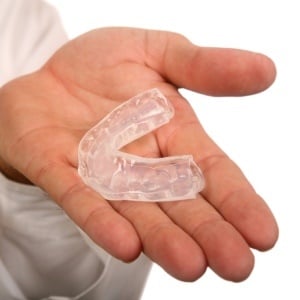
Safety gear for athletes playing contact sports should include mouthguards, say dental experts at the University of Alabama at Birmingham.
Protecting mouth and teeth
Sports-related dental injuries send more than 600,000 people to the emergency room every year, the US Centres for Disease Control and Prevention reports.
Most of these injuries involve the front teeth, but the tongue and cheeks can also be hurt while playing sports, the UAB team said.
Read: Symptoms of sports injuries
The best way to protect the mouth and teeth during sports is to wear a mouthguard, says Dr Ken Tilashalski, associate dean for academic affairs at the UAB School of Dentistry. Mouthguards have been shown to reduce the risk of sports-related dental injury by 60 times, he said.
"Wearing a mouthguard reduces the chances of tooth fractures, tooth dislocations and soft tissue cuts," Tilashalski said in a university news release. "The guards also protect against jaw fractures and concussions by absorbing the energy of a traumatic blow to the chin."
The three types of mouthguards include:
- Stock: These are preformed and ready to wear, but they may not fit well inside the mouth.
- Boil and bite: These may be customized and moulded to the mouth by softening in boiling water before biting down.
- Custom-made: A dentist tailor-makes these mouthguards to fit an individual's mouth. These mouthguards provide the best fit and the highest level of protection.
"For my kids, I have chosen to use custom mouthguards as they fit and feel better, do not interfere with speech, and are essentially invisible," Tilashalski said. "Mouthguards need to be replaced as they wear down, and athletes in the tooth-forming years will have to have these replaced more often as the mouth grows and the teeth change."
Other risky activities
After each use, rinse your mouthguard and store it in a hard container to prevent the buildup of germs, Tilashalski added. Players should also avoid chewing on their mouthguard to extend its life.
Read: Virtual sport not good enough
Mouthguards are most often associated with organised sports, but young people participating in other risky activities should also protect their teeth and mouth from serious and costly injuries, Tilashalski cautioned.
"Many cases of facial trauma are actually seen in unorganised or pickup sports activities. Biking, skating and skateboarding are the recreational sports that have the highest chances of injury," he said.
"I have four soccer players at home. Having a mouthguard in place seems a small price to pay to prevent a lifetime of dental treatment as a consequence of a knocked-out tooth," he added.
Read more:




 Publications
Publications
 Partners
Partners















